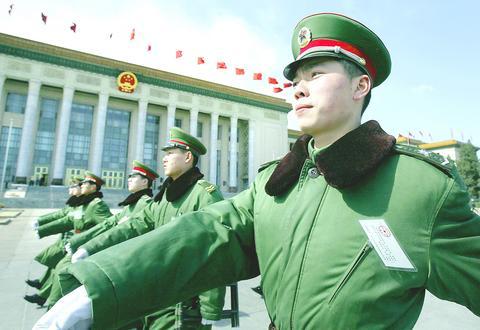Hundreds of Chinese police fanned out across Beijing yesterday, trailed dissidents and swept out-of-town petitioners away from government offices to boost security a day before the annual session of parliament.
Civilians wearing red armbands helped to keep order near the Great Hall of the People, venue of the March 5-14 session of the National People's Congress, and extra police were deployed at almost every nearby bus stop.
Officers and bomb-sniffing dogs patrolled opposite the Great Hall in Tiananmen Square, the focus of the student-led protests that ended in bloodshed in 1989, and extra precautions were taken at the dozens of hotels where the 3,000 deputies are staying.

PHOTO: AFP
Officials in the capital boosted a crackdown on petitioners and on the Falun Gong sect to ensure the safety of leaders and delegates and to prevent bombings, shootings or other terror attacks, Hong Kong's Beijing-backed Wen Wei Po newspaper said.
"Destabilizing factors that affect the capital's stability still exist," the Beijing Daily quoted the city's Communist Party chief, Liu Qi (
Violence is not unknown before the parliament session.
Beijing was rocked by bombings at two of the country's most prestigious universities in February last year. The blame was put on a man seeking publicity who was subsequently jailed for life.
A bomb exploded on a public bus in a busy shopping district in February 1997, wounding about 10 people and police suspected Muslim Uighur separatists from the far northwest.
The Paris-based media watchdog Reporters Without Borders said China had closed down some Internet chatrooms before the session.
In a landmark move, parliament will amend the Constitution and add a proposal by the Communist Party, which has ruled with an iron fist since 1949, to "respect and safeguard human rights."
But pro-democracy activist Jiang Qisheng saw no sign of change. He has been put under round-the-clock police surveillance since Feb. 24 and tailed by more than a dozen plainclothes police in two cars, one motorcycle and two bicycles.
"They told me: `Wherever you go, we go,'" Jiang said. "This is a violation of my human rights.
"They used to post their men at the entrance downstairs. Now, they're on the 13th floor outside my home," said Jiang, who was freed last year after serving four years in prison for incitement to subversion.
He was jailed for one-and-half years for his role in the 1989 protests.
Stability is the watchword. Police view disgruntled petitioners as a security threat.

Tens of thousands of Filipino Catholics yesterday twirled white cloths and chanted “Viva, viva,” as a centuries-old statue of Jesus Christ was paraded through the streets of Manila in the nation’s biggest annual religious event. The day-long procession began before dawn, with barefoot volunteers pulling the heavy carriage through narrow streets where the devout waited in hopes of touching the icon, believed to hold miraculous powers. Thousands of police were deployed to manage crowds that officials believe could number in the millions by the time the statue reaches its home in central Manila’s Quiapo church around midnight. More than 800 people had sought

DENIAL: Pyongyang said a South Korean drone filmed unspecified areas in a North Korean border town, but Seoul said it did not operate drones on the dates it cited North Korea’s military accused South Korea of flying drones across the border between the nations this week, yesterday warning that the South would face consequences for its “unpardonable hysteria.” Seoul quickly denied the accusation, but the development is likely to further dim prospects for its efforts to restore ties with Pyongyang. North Korean forces used special electronic warfare assets on Sunday to bring down a South Korean drone flying over North Korea’s border town. The drone was equipped with two cameras that filmed unspecified areas, the General Staff of the North Korean People’s Army said in a statement. South Korea infiltrated another drone

COMMUNIST ALIGNMENT: To Lam wants to combine party chief and state presidency roles, with the decision resting on the election of 200 new party delegates next week Communist Party of Vietnam General Secretary To Lam is seeking to combine his party role with the state presidency, officials said, in a move that would align Vietnam’s political structure more closely to China’s, where President Xi Jinping (習近平) heads the party and state. Next week about 1,600 delegates are to gather in Hanoi to commence a week-long communist party congress, held every five years to select new leaders and set policy goals for the single-party state. Lam, 68, bade for both top positions at a party meeting last month, seeking initial party approval ahead of the congress, three people briefed by

Cambodia’s government on Wednesday said that it had arrested and extradited to China a tycoon who has been accused of running a huge online scam operation. The Cambodian Ministry of the Interior said that Prince Holding Group chairman Chen Zhi (陳志) and two other Chinese citizens were arrested and extradited on Tuesday at the request of Chinese authorities. Chen formerly had dual nationality, but his Cambodian citizenship was revoked last month, the ministry said. US prosecutors in October last year brought conspiracy charges against Chen, alleging that he had been the mastermind behind a multinational cyberfraud network, used his other businesses to launder